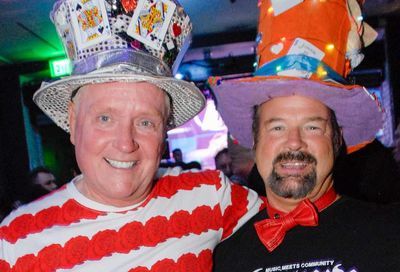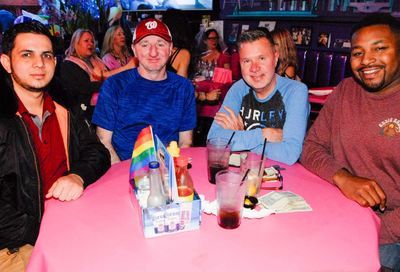Hello, Cruel World
Commentary: Center Field
This is a good time to take stock of the threats faced by GLBT people around the world. That’s because on Feb. 25, the State Department released its Country Reports on Human Rights Practices for 2008. The Council for Global Equality a day later released its extract of sexual-orientation and gender-identity references for 190 countries. That and a list of ”Top Ten Opportunities for the U.S. to Respond” are at www.globalequality.org. The dishonor roll includes Egypt, the Gambia, Honduras, India, Jamaica, Kuwait, Kyrgyz Republic, Lithuania, Nigeria and Uganda.
The Council notes that many of the worst anti-gay abuses were committed by American allies, ”including those that receive sizeable U.S. development or security assistance.” Egypt was the third largest recipient of aid from the State Department and the U.S. Agency for International Development (USAID) in 2008, while Uganda is a leading recipient of PEPFAR (President’s Emergency Plan for AIDS Relief) funding for prevention and treatment of HIV/AIDS. The Council believes that ”the State Department must move beyond a reporting agenda to an affirmative ‘protection agenda’ that actively seeks to redress these serious and ongoing human rights violations.”
There were plenty of abuses outside the ”top ten.” In Russia: ”On June 1, gay pride activist Alexey Davydov was assaulted while addressing reporters at the Moscow Gay Pride event.” In the Netherlands: The U.N. high commissioner for refugees ”raised cases in which protection from return to unsafe countries appeared to have been violated….” In Cameroon (where homosexual activity can bring sentences of up to five years in prison): ”Homosexuals suffered from harassment and extortion by law enforcement officials.” In the Bahamas: ”In 2006 the Constitutional Review Commission found that sexual orientation did not deserve protection against discrimination.”
One grim lesson the reports teach is that the sun never sets on anti-gay laws stemming from the British colonial era. Countries from Brunei to Zambia continue to criminalize acts ”against the order of nature,” despite England having decriminalized homosexual acts in 1967. Human Rights Watch observed in December that ”the model British-era sodomy law made no distinction between consensual and non-consensual sex, or between sex among adults and sexual abuse of children. As a result, these surviving laws leave many rape victims and child victims of abuse without effective legal protection.”
Gay rights groups were among the non-governmental organizations (NGOs) that pressed efforts in many countries despite grave risks. They included the Blue Diamond Society in Nepal; Sangama in Bangalore, India; ACCEPT in Romania; Gemini in Bulgaria; and Rainbow Project in Namibia. NGO representatives were assaulted in Jamaica, Honduras, Croatia, Uganda and India.
Prejudice and violence persist even in countries that have made great strides. For example, in South Africa, which legalized same-sex marriage in 2006, a Social Attitudes Survey by the Human Sciences Research Council found that homosexuality was widely considered ”unAfrican” and gay sex was opposed by 80 percent of respondents. Also in South Africa, four men were charged with the rape and murder of lesbian activist and former soccer player Eudy Simelane east of Johannesburg. No arrests were made in the July 2007 murders of a lesbian couple in Soweto and a lesbian in KwaZulu-Natal.
There was some good news. Argentina’s National Social Security Administration granted widowed same-sex partners inheritance rights to their partners’ pensions. Turkey’s Supreme Court of Appeals on Nov. 28 overturned an Istanbul court ruling which had cited Turkish ”moral values and family structure” in shutting down Lambda Istanbul. The Lithuanian government paid 40,000 euros to a transsexual woman after the European Court of Human Rights ruled her privacy rights had been violated.
The reports for Iceland, Denmark, Sweden and the Netherlands mention their gay-inclusive laws against hate speech. These laws are double-edged swords, because they tend to blur the distinction between mere disagreeable speech and incitement to violence. Denmark’s prohibition of blasphemy could place gay-rights advocates afoul of the law if they mount a public response to, say, Islamist homophobia. Indeed, one cannot write about European trends in Islamist anti-gay intolerance without being called Islamophobic by gay leftists. But there is no safety in silence.
The State Department reports for 2008, while gathered during the Bush Administration, have a preface by Secretary of State Hillary Rodham Clinton. This underscores the continuity provided by the career foreign-service officers who do most of the work. May their efforts continue and expand.
Richard J. Rosendall is a writer and activist whose work has appeared on Salon.com and the Independent Gay Forum, www.indegayforum.org. He can be reached at rrosendall@starpower.net.
Support Metro Weekly’s Journalism
These are challenging times for news organizations. And yet it’s crucial we stay active and provide vital resources and information to both our local readers and the world. So won’t you please take a moment and consider supporting Metro Weekly with a membership? For as little as $5 a month, you can help ensure Metro Weekly magazine and MetroWeekly.com remain free, viable resources as we provide the best, most diverse, culturally-resonant LGBTQ coverage in both the D.C. region and around the world. Memberships come with exclusive perks and discounts, your own personal digital delivery of each week’s magazine (and an archive), access to our Member's Lounge when it launches this fall, and exclusive members-only items like Metro Weekly Membership Mugs and Tote Bags! Check out all our membership levels here and please join us today!




















